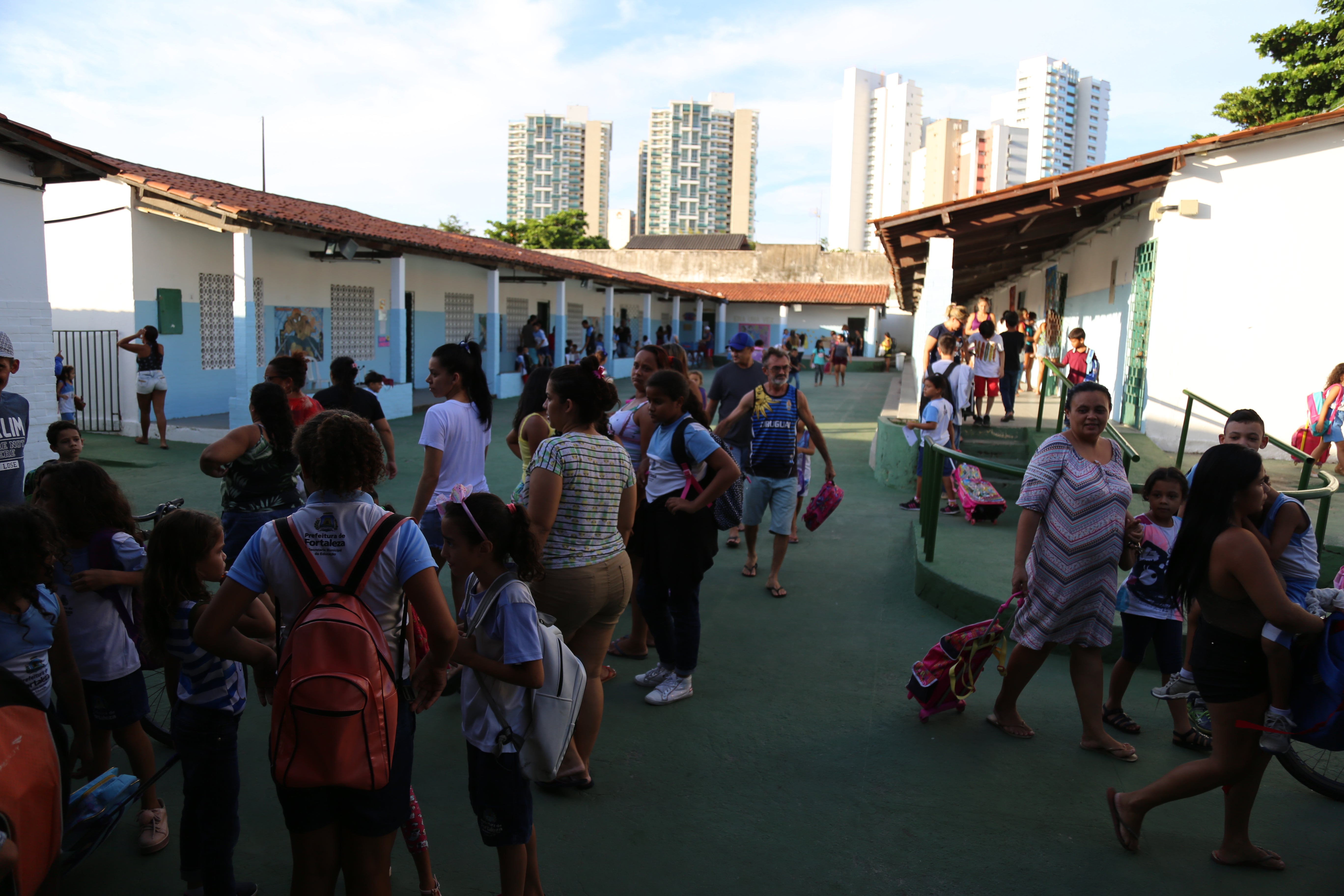 Famílias buscam crianças na escola em Fortaleza, Brasil
Famílias buscam crianças na escola em Fortaleza, Brasil
In Brazil's northeastern city of Fortaleza, many schools operate in poor neighborhoods that present educators with multiple challenges to keep students in schools. Yet in under a decade, this city has lowered the dropout rate for lower-secondary students from 30 percent to 0.6 percent. And in just four years–from 2013 to 2017–Fortaleza reduced the number of fifth graders with very poor literacy skills from 24 % to only 8 %.
What has been the driver for this success? A dogged approach to reducing school dropout.
If a student doesn’t show up, they activate a search to locate the child. First the school makes a call. It is recorded that a call has been made. If the school can’t get hold of the child or parent, the school has to go to the house. All of this happens on the same day of the child being absent. Last year, schools made more than 20,000 phone calls and conducted more than 3,000 home visits. This year, municipal government of Fortaleza hired three-dozen nongovernmental and other organizations to work with students requiring more effort.
It all sounds straightforward, right? Yet mobilizing multiple local government agencies, from schools to social services to police departments, to help keep children in school is where local governments often fail, even in much wealthier countries. The idea that a mayor in Brazil can mobilize all schools to take such proactivity and see such clear, rapid results is extraordinary.
One strategy that has helped to drive such enthusiasm is the introduction of results-based incentives: To get more funds from the state government, municipalities have to show improvements. And different departments must work together to secure these gains.
Improve outcomes, receive more funds
Ceará, one of Brazil's poorest states of which Fortaleza is the capital, presents one of the first documented cases showing how a results-based intergovernmental transfer mechanism can lead to reductions in dropout rates and improvements in learning gains. Since it began linking part of its fiscal transfers for municipalities to education performance in 2007, the state has seen some of the country's biggest improvements in quality of education, with nine of its municipalities ranking among Brazil's top 20 in 2017.
For countries eager to lower dropout rates and improve learning outcomes, Ceará’s experience with results-based financing offers some useful lessons. And these lessons will become even more relevant in the current COVID-19 context where learning outcomes will likely fall and drop-outs increase, and there is both a need to address these short-term costs and improve education systems in the longer-term.
First, each year, Ceará distributes a fixed pot of money. This means that municipalities are in competition with one another for resources from that pot.
Second, to achieve more resources, municipalities do not need to have the highest test scores or the lowest dropout rates; they merely need to show improvements. But this implies municipalities must seek further improvements each year to receive funds from the pot; those that rest on their laurels will likely lose funding. In Ceará’s case, it was the poor municipalities that really seized the opportunity, with some securing funding increases of as much as 60% to 70%.
Third, municipalities do not have to spend the additional funds on education but can channel them into other services, such as improving sidewalks or public parks. This immediately elevates the profile of the municipal education secretary. From being at the bottom of the local hierarchy, he or she becomes the mayor’s best friend. Mayors realize that, to get more money for their municipality–and heighten their chance of reelection–children needed to stay in school and learn.
Beyond getting more money
The approach to funding was not the only thing Ceará changed in 2007. As Vice Governor Izolda Cela put it during a World Bank visit to the state in early-2020, “it is not enough to tell people that a stack of gold sat at the end of the swimming pool if they don’t know how to swim.” To assists municipalities, the state provides:
- Technical assistance under an existing literacy initiative.
- Schools receive learning materials that define a clear routine for classes and prioritize basic skills, especially literacy in the early grades.
- Teachers undergo regular training on how to use these materials, including classroom observation with feedback.
- High-performing schools are incentivized to mentor low-performing ones to improve the latter's performance.
- Training and materials to municipal education secretariats, with the goal of increasing classroom teaching time, reducing the number of multigrade classes, adopting meritocratic selection criteria for school principals, and offering financial and nonfinancial incentives for teachers whose students meet literacy targets.
What are some preconditions needed for this to work?
Municipalities need to be responsible for schools and empowered. Unlike most Brazilian states, Ceará has devolved management of virtually all public primary and lower secondary schools to municipal governments , giving them autonomy to decide what strategies work best for them.
Additionally, Ceará needed the ability to credibly and transparently measure those results. Most importantly, this meant measuring student-learning outcomes. In Brazil, there are national assessments in fifth and ninth grade, but Ceará officials, after observing the poor outcomes in grade 5, introduced an annual learning assessment in literacy for second graders.
As those of us working to improve education outcomes know, there are no easy, one-size-fits-all solutions. In our search for answers, we often focus on what top performers in international assessments–Singapore, South Korea, Finland–are currently doing. Yet these countries undertook and sustained reforms over decades .
Ceará offers an opportunity to observe in real time how a poor state with a large school system is virtually eliminating dropout and dramatically improving learning . If COVID-19 were not here, I would recommend a study tour to Ceará. Instead, let me suggest a “virtual study tour” in the company of some recent World Bank publications.


Join the Conversation